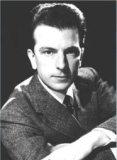
Issay Alexandrovich Dobrowen (27 February 1891 – 9 December 1953) was a Russian-Norwegian pianist, composer and conductor. He was born Itschok Zorachovitch Barabeitchik in Nizhny Novgorod, Russian Empire. He left the Soviet Union in 1923, and became a Norwegian citizen in 1929. He once played Beethoven's Sonata Appassionata to Vladimir Lenin, whose favorite piece of music this was. Dobrowen directed the first German performance of Mussorgsky's Boris Godunov (Dresden, 1922). Dobrowen went on to conduct the Oslo Philharmonic orchestra (1928-31), at the Budapest Opera (1927-28), and the San Francisco Symphony (1931-34) and the Gothenburg Symphony (1941-53) orchestras. Dobrowen worked with both Nikolai Medtner and Artur Schnabel, among other well known musicians. He was also a close friend of the Russian writer Maxim Gorky, and the Norwegian explorer Fridtjof Nansen. He conducted his last concert with the Oslo Philharmonic in December 1952. His last concert was held on 19 January 1953, when he conducted the Stuttgart Orchestra. He died 9 December 1953 in Oslo at the age of 62. Relatively unknown today, he wrote very beautiful piano music, reminiscent of Sergei Rachmaninoff. Interest in Dobrowen as a composer has started to increase, thanks to a small number of new recording projects, involving the editing and collation of orchestral parts for his Piano Concerto in C sharp minor (Op. 20). As well as the concerto, of which the style and colourful orchestration ingeniously recall Medtner, Rachmaninoff and Alexander Scriabin, adding his own vein of attractive melancholy, three of the piano sonatas and a violin sonata have also appeared on disc in recent times.

Guido Cantelli (April 27, 1920 – November 24, 1956) was an Italian orchestral conductor. Born in Novara, Italy, Cantelli was named Musical Director of La Scala, Milan on November 16, 1956, but his promising career was cut short only one week later by his death at the age of 36 in an airplane crash in Paris, France. In the course of his brief career, he had conducted not only in many of the most famous concert halls of Europe but also in the United States and South Africa. The famous conductor Arturo Toscanini was particularly impressed by him, and, in a note written to Cantelli's wife Iris in 1950 after four concerts where Cantelli had been a guest conductor with the NBC Symphony Orchestra, said: I am happy and moved to inform you of Guido's great success and that I introduced him to my orchestra, which loves him as I do. This is the first time in my long career that I have met a young man so gifted. He will go far, very far. Toscanini, who died less than two months after Cantelli's plane crash, was never told of Cantelli's death. 
Dimitri Mitropoulos (1 March 1896 – 2 November 1960), was a Greek conductor, pianist, and composer. Mitropoulos was born in Athens, the son of Yannis and Angeliki Mitropoulos. His father owned a leather goods shop at No. 15, St Marks Street. He was musically precocious, demonstrating his abilities at an early age. From the ages of eleven to fourteen, when Mitropoulos was in secondary school, he would host and preside over informal musical gatherings at his house every Saturday afternoon. His earliest acknowledged composition - a sonata for violin and piano, now lost - dates from this period. He studied music at the Athens Conservatoire as well as in Brussels and Berlin, with Ferruccio Busoni among his teachers. From 1921 to 1925 he assisted Erich Kleiber at the Berlin State Opera and then took a number of posts in Greece. At a 1930 concert with the Berlin Philharmonic, he played the solo part of Prokofiev's Piano Concerto No. 3 and conducted the orchestra from the keyboard, becoming one of the first modern musicians to do so. Mitropoulos made his U.S. debut in 1936 with the Boston Symphony Orchestra, and he later settled in the country, becoming a naturalized citizen of the United States in 1946. From 1937 to 1949, he served as the principal conductor of the Minneapolis Symphony Orchestra (now known as the Minnesota Orchestra). In 1949 Mitropoulos began his association with the New York Philharmonic, the peak of his orchestral career. He was initially co-conductor with Leopold Stokowski, and became the sole music director in 1951. Mitropoulos recorded extensively with the Philharmonic for Columbia Records and sought to reach new audiences through appearances on television and conducting a week of performances at the Roxy Theatre, a popular movie theatre in New York. Mitropoulos expanded the Philharmonic's repertoire, commissioning works by new composers and championing the symphonies of Gustav Mahler. In 1957 he was succeeded as the Philharmonic's conductor by a protégé, Leonard Bernstein. In addition to his orchestral career, Mitropoulos was an equally important force in the operatic repertoire. He conducted opera extensively in Italy and from 1954 until his death in 1960 was the principal conductor of the Metropolitan Opera in New York, although the Met did not officially use that title at the time. His musically incisive and dramatically vivid performances of Puccini, Verdi, Richard Strauss and others remain models of the opera conductor's art. The Met's extensive archive of recorded broadcasts preserves many of these fine performances. Mitropoulos's series of recordings for Columbia Records with the New York Philharmonic included a rare complete performance of Alban Berg's Wozzeck. Many of these have been reissued by Sony Classics on CD, including most recently his stereo recordings of excerpts from Prokofiev's Romeo and Juliet. For RCA he recorded with the Minneapolis Symphony during the 78-rpm era. He was also represented on the Cetra label, most notably with an early recording of Richard Strauss's Elektra. He was noted for having a photographic memory (which enabled him to conduct without a score, even during rehearsals) and for his monk-like life style due to his deeply religious, Greek Orthodox beliefs. Mitropoulos never married. He was "quietly known to be homosexual" and "felt no need for a cosmetic marriage". Among his relationships reportedly was one with Leonard Bernstein. He died in Milan, Italy at the age of 64, while rehearsing Gustav Mahler's 3rd Symphony. One of his very last recorded performances was Verdi's La forza del destino with Giuseppe Di Stefano, Antonietta Stella and Ettore Bastianini at Vienna on 23 September 1960. A recording exists of the performance of Mahler's 3rd Symphony given by Mitropoulos with the Cologne Radio Symphony on 31 October 1960, just two days before his death. P. I. Tchaikovsky Symphony No. 4 in F Minor op. 36 Philharmonia Orchestra Issay Dobrowen 1946-48 NBC Symphony Orchestra Guido Cantelli 1954 Minneapolis Orchestra Dimitri Mitropoulos 4.11.1940
|

